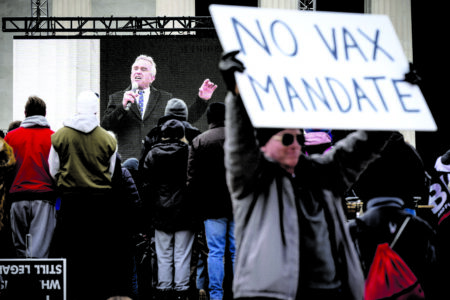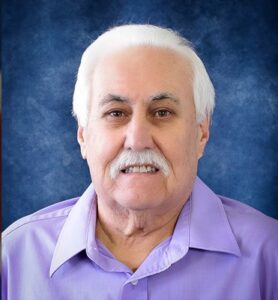Anti-science fervor spreads
420 bills attacking public health protocols flood statehouses across US

FILE - Robert F. Kennedy Jr. is broadcast on a large screen as he speaks during an anti-vaccine rally in front of the Lincoln Memorial in Washington, Sunday, Jan. 23, 2022. (AP Photo/Patrick Semansky, File)
About 420 anti-science bills attacking longstanding public health protections — vaccines, milk safety and fluoride — have been introduced in statehouses across the U.S., including Ohio, this year.
An Associated Press investigation found that the wave of legislation has cropped up in most states, pushed by people with close ties to Health and Human Services Secretary Robert F. Kennedy Jr. The effort would strip away protections that have been built over a century and are integral to American lives and society. Around 30 bills have been enacted or adopted in 12 states.
Trump administration officials are directing activists to push anti-science legislation in the states –where public health authority rests — with the ultimate goal of changing laws and minds nationally.
The effort normalizes ideas fueled by the anti-vaccine movement that Kennedy has helped lead for years. His Make America Healthy Again agenda includes anti-science ideas while promoting goals such as making food more natural or reducing chemicals. Meanwhile, vaccination rates continue to fall, allowing the infectious diseases measles and whooping cough to make comebacks as Kennedy has sought to broadly remake federal policies on public health matters including fluoride and vaccines.
Kennedy’s allies dispute that their agenda is anti-science or driven by conspiracy theories, but many experts disagree.
“The march of conspiracy thinking from the margins to the mainstream now guiding public policy should be a wake-up call for all Americans,” said Devin Burghart, president and executive director of the Institute for Research and Education on Human Rights, who has tracked the anti-vaccine movement for decades. “People are literally going to die from it as a result.”
Ashlee and Erik Dahlberg of Lowell, Indiana, lost their 8-year-old son, Liam, to a vaccine-preventable disease in April.
“I thought having the vaccines would protect our children,” Erik Dahlberg said. “Unfortunately, it did not because other kids, other adults, need to be vaccinated as well in order for it to work.”
Liam was particularly vulnerable because he had severe asthma and allergies. He was vaccinated against Haemophilus influenzae type b, or Hib, but the disease caused his brain to swell and killed him less than two days after he complained of a headache. Hib is transmitted by respiratory droplets, often spread by coughs and sneezes. Doctors said Liam’s case likely stemmed from someone unvaccinated, Ashlee Dahlberg said.
With two other children, the Dahlbergs worry about living in one of the many U.S. communities with low immunization rates. State statistics show one in five kindergartners in their county don’t meet vaccination requirements.
“There’s no pain that is worse than the pain of losing a child,” said Ashlee Dahlberg, who brings an urn with Liam’s ashes on family camping trips so he won’t be left out. “I do not – and can’t – live through the loss of another.”
Hundreds of anti-vaccine bills
The Dahlbergs and others are fighting a strong anti-science movement that stresses “health freedom” but disputes proven health measures. Experts say global vaccine efforts have saved more than 150 million lives since 1974, cavities have declined dramatically since community water fluoridation began in 1945, and milk pasteurization has saved millions from foodborne illness.
Despite those successes, activists spread theories, some dating back decades, that safe vaccines injure or kill large numbers of people, that fluoride is used to poison the population or that pasteurization makes milk less nutritious and primarily benefits the dairy industry.
In its analysis of legislation, AP focused on these three public health policies, which have clear medical evidence behind them and are targets of the Make America Healthy Again movement. AP searched 2025 legislation in all 50 states, analyzing more than 1,000 bills collected by the National Conference of State Legislatures and the bill-tracking software Plural for whether they undermined science-based protections for human health.
Anti-vaccine bills – 350 of them – were by far the most common. They come at the issue from various angles: barring discrimination against unvaccinated people, creating the criminal offense of vaccine harm, requiring blood banks to test for evidence of vaccinations and instituting a 48-hour vaccine waiting period.
Legislators acknowledge they sometimes draw inspiration from other states: Bills in numerous places target mRNA vaccines, which were credited with saving millions of lives during the COVID-19 pandemic. Two bills in Minnesota falsely designate them as “weapons of mass destruction.”
The AP study found anti-vaccine, raw milk and anti-fluoride bills pending in the Ohio General Assembly.
Most bills haven’t passed – some died and others are pending – but at least 26 anti-vaccine laws have been adopted in 11 states this year.
Most of those bills were supported by at least one of four national groups connected to Kennedy: MAHA Action, Stand for Health Freedom, the National Vaccine Information Center and the Weston A. Price Foundation.
The groups also opposed dozens of science-driven bills, including one that would protect people by tightening rabies vaccine requirements for pets.
There’s a web of connections among the groups and Kennedy. MAHA Action has been run by people close to him, including his longtime book publisher, Tony Lyons, and former campaign staffer Del Bigtree. Stand for Health Freedom was co-founded by Sayer Ji, who now advises the group and volunteers with MAHA Action.
The group Kennedy used to lead, Children’s Health Defense, was a sponsor of conferences held by NVIC and Weston Price. Kennedy has been a featured speaker for both groups. When Kennedy purged the federal committee that advises on vaccines, he picked NVIC’s research director as a new member.
While the groups don’t always agree or coordinate efforts, they sometimes work together. NVIC, Stand for Health Freedom and Weston Price collaborated on a June letter to President Donald Trump’s Religious Liberty Commission, asking that the federal government stay out of state public health lawmaking — including religious exemptions for vaccines.
Anti-vaccine activists have noticed the tide turning away from science-driven legislation, and there has been a reversal: NVIC said that in 2015, it opposed six times as many bills as it supported. Last year, it supported more than twice as many bills as it opposed.
In an email to AP, NVIC leader Barbara Loe Fisher called the federal response to the COVID-19 pandemic heavy-handed but a wake-up call in state legislatures, where “lawmakers understood the danger to liberty posed by vaccine mandates in a way they had not understood it before.”
She said mandatory vaccination is bad public health policy.
The groups AP tracked send out alerts, organize phone campaigns, flood lawmakers’ inboxes and social media, hold Zoom calls with activists nationwide, and send members to testify in statehouses.
Lyons told AP the point of the calls is to educate people. He objected to the use of the terms anti-science and conspiracy theories, saying, “It’s just an inflammatory statement meant to get millions of people to think something bad is happening.”
The groups’ work reflects the small anti-vaccine movement’s growing clout, said Northe Saunders, president of American Families for Vaccines. Advocates know how to raise money for candidates and create anti-vaccine champions, he said, and use legislative maneuvers to hold up some bills and help others past hurdles.
“They’re really a sophisticated political operation as opposed to just a couple of parents that don’t want to vaccinate their kids,” Saunders said.
In Indiana, Republican Rep. Bruce Borders sponsored two bills at the request of the group Hoosiers for Medical Liberty. One would allow people to opt out of employer vaccine mandates; another would require vaccine manufacturers to conduct certain safety studies.
Borders, who owns an insurance company and works as an Elvis impersonator, said he’s driven by concern about his grandson, who he believes developed autism after getting vaccinated – though there’s no credible scientific evidence that’s possible.
He said these bills aren’t anti-science and that he respects doctors but believes some medical questions deserve more scrutiny.
“I’ve done tons of research on this issue because of my grandson,” Borders said. “I would say that my study on these issues would equal that of many people in the medical field.”



